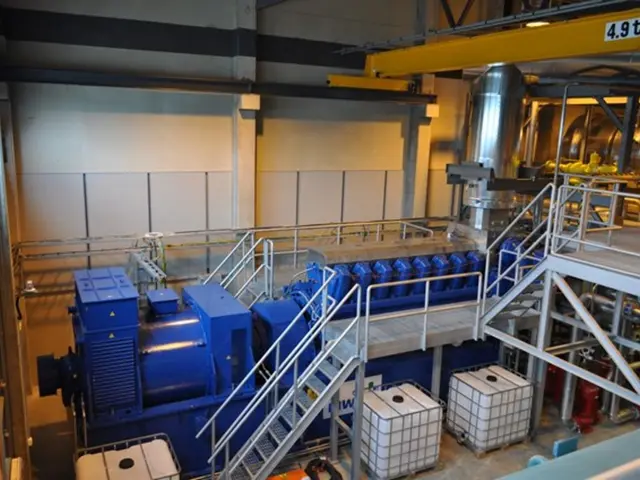Unleashing the Power of 5G: A Bright Future Awaits
Emerging 5G Technology's Impact on Reshaping the Connectivity Landscape
5G technology, the next generation of mobile networks, is here to shake up the world of wireless communication. As an evolution of its predecessor 4G, 5G promises faster speeds, sharper connections, and a multitude of revolutionary applications.
5G's primary strength lies in its substantial increase in bandwidth, allowing for lightning-fast downloads and uploads. This upgrade paves the way for seamless streaming of high-definition content, real-time gaming, and lag-free video calls. But that's not all—with 5G, latency drops to an incredible one millisecond, offering instantaneous response times for apps that require split-second reactions, such as autonomous vehicles and remote surgeries. This remarkable shift in speed and reliability isn't just a game-changer for personal communications, but it also opens the door to groundbreaking innovations across various industries.
The low latency of 5G networks allows for more responsive data sharing, making it ideal for the development of smart cities and IoT (Internet of Things) devices. With the power to connect millions of devices simultaneously without compromising performance, 5G will transform our urban environments into more efficient, smart, and interconnected spaces.
From smart homes to telehealth, 5G's impact on daily life is imminent. High-quality connections will enable a smooth flow of information, making everything from online education to remote work easier and more efficient than ever. As more people embrace and rely on these technologies, the demand for exceptional connectivity will only grow. Adopting 5G will be essential for meeting this escalating need and shaping the future of how we live and work.
5G's untapped potential is immense, with numerous sectors set to benefit. In healthcare, 5G will foster the growth of telemedicine by enabling real-time consultations and remote patient monitoring in remote areas. This leap forward in healthcare will not only improve access to essential services but also raise the overall quality of care available to all.
Autonomous vehicles, transportation, and manufacturing stand to gain significantly from the integration of 5G. Faster and more reliable communications will allow for the development of smarter, safer, and more efficient transportation networks, reducing congestion and minimizing accidents. In manufacturing, 5G will bring about more automated production lines, real-time data monitoring, and predictive maintenance, all leading to increased efficiency and cost savings.
Entertainment will also be revolutionized as augmented reality (AR) and virtual reality (VR) applications take center stage. With 5G's high-speed data transfer capabilities, consumers can immerse themselves in rich, interactive experiences and live-streamed events like never before.
That said, the rollout of 5G isn't without its hurdles. To capitalize on its transformative potential, governments, policy-makers, and industry leaders will need to address challenges related to infrastructure costs, cybersecurity concerns, and interoperability issues. Collaborative efforts between public and private sectors, as well as a thoughtful approach to 5G implementation, will be essential for ensuring a smooth transition and minimizing potential disruptions.
Embracing the 5G revolution means opening ourselves to a future of thrilling innovations, heightened productivity, and unprecedented interconnectedness. But it also means understanding the broader implications that come with this brave new world. By adopting a curious, adaptive mindset, we can seize the full power of 5G technology and join forces to shape a connected world that empowers us all to thrive.
Enrichment Data: Adapting to 5G: Addressing challenges in smart cities
As 5G technology optimizes the functionality of smart cities, addressing critical challenges is crucial for successful implementation. Behind the promise of a convenient, connected, and efficient urban environment, several issues can arise without proper planning and consideration:
- Infrastructure Complexity: 5G's extensive network of small cell towers and fiber connectivity requires substantial investment, which can be challenging, especially in crowded urban areas with outdated infrastructure. Strategic placement, collaboration, and clever utilization of existing resources are needed for cost-effective implementation.
- Cybersecurity Risks: The increased attack surface presented by a smart city's heavy reliance on interconnected IoT devices could make cyberattacks more likely. It's essential to prioritize strong end-to-end encryption, strict data privacy protocols, and continuous monitoring to ensure the safety and security of smart city infrastructures.
- Vendor Lock-in: Reputable, long-term vendors are vital for reliability and future upgrades, but they can also lead to proprietary ecosystems and high costs. Open, modular platforms may help avoid vendor lock-in and support greater flexibility in adapting to the evolving 5G landscape.
- Digital Divide: If not addressed proactively, smart city initiatives may exacerbate socio-economic inequalities due to unequal digital literacy and access. Public-private partnerships, digital inclusion campaigns, and diverse citizen involvement are key to ensuring equal opportunities in the smart city revolution.
Tackling these challenges thoughtfully will be crucial for smart cities to leverage the benefits of 5G while sustaining long-term viability and upholding social justice.
- The education sector can benefit greatly from 5G, as it enables seamless streaming of educational content, facilitating remote learning and improving access to knowledge globally.
- In the realm of personal finance, faster and more reliable data transfer offered by 5G technology can lead to streamlined investment processes and improve financial services overall.
- The fashion-and-beauty industry may see a surge in the adoption of virtual try-on applications, allowing customers to preview clothes or makeup in real-time, thanks to the lightning-fast speeds provided by 5G networks.
- With 5G, food-and-drink establishments can leverage online ordering and delivery services more effectively, ensuring a smooth and efficient customer experience, even during busy hours.
- The artificial intelligence (AI) industry will be invigorated by the increased speed and capacity of 5G networks, leading to real-time AI-powered analytics and decision-making in businesses.
- 5G's low latency will enable smoother and more responsive data sharing for gamers, enhancing their gaming experiences with minimal delays.
- The home-and-garden industry could see the growth of smart home automation, as 5G technology allows for real-time monitoring and control of various household appliances, ensuring enhanced convenience and energy efficiency.
- Gadgets like smartphones and wearables will be revolutionized with 5G integration, providing users with longer battery life, faster performance, and improved mobility.
- In the travel industry, 5G's ability to facilitate real-time data transfer can lead to more seamless booking and communication processes, making travel more convenient for consumers.
- Sports enthusiasts can look forward to experiencing live sports events in near-real-time using virtual reality (VR) technology, thanks to the lightning-fast speeds offered by 5G networks.
- The art world can take advantage of 5G's high-speed connections for streaming virtual art exhibitions, offering a new frontier for artists to share and exhibit their work.
- The weather industry could innovate by integrating weather sensors and IoT devices with 5G networks, collecting and analyzing data in real-time, enabling more accurate and timely weather forecasts.
- Data-and-cloud-computing providers will be better equipped to handle increased demand for streamlined and secure data storage and processing services, as 5G technology paves the way for the Internet of Things (IoT).
- Cybersecurity solutions will play a critical role in ensuring the security of 5G networks and devices, preventing potential cyber-attacks and protecting user data privacy in the ever-connected world of 5G.






